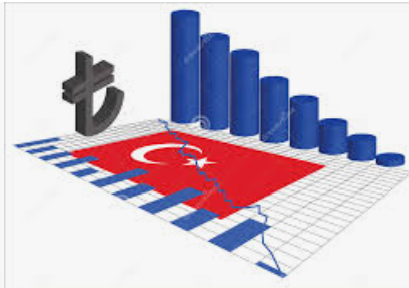Analysts expect Turkey’s economic crisis to worsen after President Tayyip Erdoğan came top in the first round of the country’s presidential election and his party gained a parliamentary majority in a legislative vote.
The Turkish lira, which has devalued steadily in recent years including halving in value in one year alone, dropped close to a historic low as markets opened the morning after Sunday’s vote.
President Erdoğan subverted expectations by coming out on top, gaining 49.5% of the vote in the presidential race compared with 44.9% for his challenger, Kemal Kılıçdaroğlu. As neither candidate reached the 50% threshold needed to win outright, a runoff vote will take place on 28 May.
Erdoğan’s governing alliance, made up of his Justice and Development party as well as a group of nationalist parties, also surged to secure a parliamentary majority.
Widespread concern about a cost of living crisis did not drive away support for Erdoğan at the polls, even though his unorthodox economic policies, including a long-term aversion to raising interest rates, have contributed to rising inflation and the increasing cost of food and other basic goods.
“Hopes of an opposition victory and a return to orthodox policymaking have evaporated,” wrote Liam Peach, of Capital Economics. “Instead, there is now a very real risk that an Erdoğan victory could lead to macroeconomic instability in Turkey, including the threat of a severe currency crisis and strains in the banking and sovereign debt positions further down the line.”
Turkey is the world’s 19th largest economy, according to the World Bank. It has noted that the Turkish economic crisis of the past five years has been accompanied by efforts to support economic growth “with credit booms and demand stimulus”. Economists from Bloomberg estimate the Turkish central bank has spent more than $177bn supporting the lira since December 2021.
The Turkish Inflation Research Group (ENAG), which measures inflation on a basket of goods and services, recorded a 105.19% price increase last month on the previous year, adding that prices were up by almost a third compared with the beginning of 2023.
The price of onions, a staple in Turkish cuisine, quickly became a talking point in the election after Kılıçdaroğlu released a video last month stating: “Now, one kilogram of onions is 30 liras, if [Erdoğan] stays it will be 100 liras.”
Erdoğan hit back at an election rally, dismissing concerns about the rising price of food. “Our cause is great. We know how to smash an onion with our fist and how to eat it. In this country, there is no [expensive] onion, potato or cucumber problem. We have already fixed problems in Turkey,” he said.
The US credit rating agency Fitch Ratings pointed to Turkey’s dwindling foreign reserves caused by attempts to stabilise the lira, forecasting difficulties for the next government.
“Regardless of who wins, the next government will still face a challenging economic backdrop characterised by pent-up foreign exchange demand and pressure on the lira, a wide current account deficit, declining international reserves and high inflation,” it said.
The prospect that members of Turkey’s six-party opposition coalition could secure victory in order to restore international confidence in the Turkish economy and return to more orthodox economic policies appeared increasingly unlikely.
Speaking before the first round of voting, the economist Bilge Yılmaz, of the nationalist IYI party, said Turkey’s economic crisis potentially outstripped anything the country had endured in decades.
“Turkey right now is deprived of foreign capital because it’s not predictable, it’s not trustworthy … there are effectively zero dollars left, for all practical purposes zero,” he said.
theguardian.com
